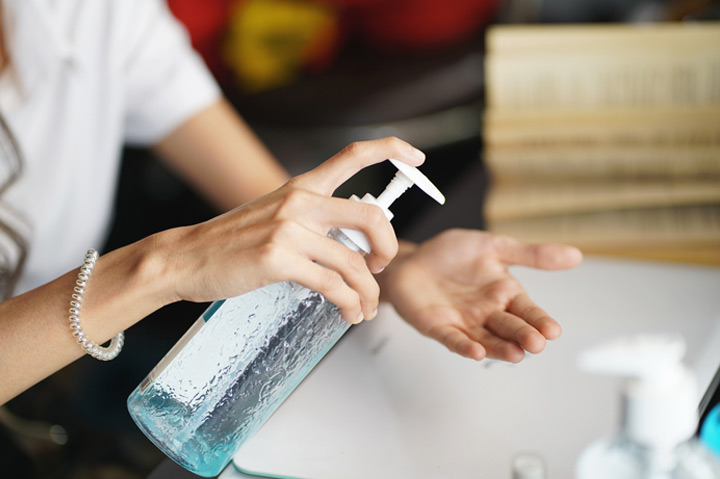Product Hub March 29, 2022
FDA Sunsets Relaxed Standards for Manufacturing Hand Sanitizer
Manufacturers must stop distributing sanitizer made under pandemic-era temporary guidelines by March 31 and destroy what product they have left. Here, promo pros offer sourcing tips.
Companies in the promotional products space and other industries that produced alcohol-based hand sanitizer under temporary standards the U.S. Food and Drug Administration (FDA) issued during the COVID-19 pandemic are prohibited from selling and distributing such product after March 31, 2022.
In a recent communication, the FDA says that after the end of March, manufacturers should destroy any remaining stock of hand sanitizer produced under the temporary guidelines. The agency notes that disposal of hazardous waste, including flammable liquids like alcohol, is regulated by the Environmental Protection Agency and local waste management authorities. The FDA suggests contacting local waste management and recycling centers for details on legal disposal.

“Manufacturers should maintain records with information concerning a returned drug product’s destruction, including the product name, manufacturer, lot number, quantity, disposition date and disposition method,” the FDA advises.
During the earlier days of the pandemic, demand for alcohol-based hand sanitizer vastly outpaced supply. In reaction, the FDA relaxed certain requirements, implementing what it described as temporary guidelines for producing and distributing sanitizer, which allowed larger quantities of the product to make it to market fast to meet the rampant need of everyone from consumers to hospitals. Among other things, the relaxed standards enabled companies that didn’t typically make sanitizer – think distilleries, as one example – to begin speedily producing and selling the product.
But, as authorities detail, sanitizer supply has caught up with demand, compelling the FDA to bring an end to the temporary standards. The first big date in the change was Dec. 31, 2021; after that, companies were prohibited from manufacturing any more sanitizer under the temporary standards. They then had three months to sell off/give away remaining stock. Now, that period for distribution is coming to an end.
“Businesses wishing to continue producing hand sanitizer can do so as long as they comply with all applicable regulatory requirements,” the FDA notes. This includes complying with the FDA’s Current Good Manufacturing Practice requirements to assure that a drug has the ingredients, strength and quality it claims to have.
In an important distinction, the FDA says that retailers can sell their remaining stock of hand sanitizer produced under the temporary guidance after April 1. They just can’t source any more of that product from manufacturers.
“Withdrawing the guidance is not a requirement to recall all hand sanitizer produced under the temporary policies,” the FDA says, reiterating: “The withdrawal notice explains that producers that had been producing hand sanitizers under the temporary policies must stop making new hand sanitizer on Dec. 31, 2021, and they must stop distribution of any remaining hand sanitizer products produced under the guidance by March 31, 2022.”
Tips for Distributors Sourcing Hand Sanitizer
Of significance to promo products distributors that may be sourcing hand sanitizer for clients, the FDA shares that it’s often “not evident” if a sanitizer was made under the temporary standards or not. The agency recommends contacting the manufacturer/company you’re interested in sourcing from for the product details.
“The best practice is to choose a supplier partner who is FDA-registered and manufacturers in the United States, and who can answer your questions regarding quality and testing – and who has a proven track record,” says Brandon Mackay, CEO of West Jordan, UT-based Top 40 supplier SnugZ USA (asi/88060) and a member of Counselor’s Power 50 list of promo’s most influential people. “Be sure to ask for all the necessary compliance documentation.”
“With the temporary guidelines going away, we’ll have a clearer picture of who the proper sanitizer companies to source from are.” Pam Ferguson, Tekweld
Like SnugZ, Top 40 supplier Tekweld (asi/90807) is a significant provider of hand sanitizer in the promo products space. Pam Ferguson, the Hauppauge, NY-based firm’s vice president/top compliance officer, advises distributors to ask for documentation like a toxicology risk assessment and the product’s National Drug Code (NDC) number, which serves as an FDA identifier for valid drugs. The number identifies the labeler, product and trade package size.
Nathan Cotter agrees that it’s smart to undertake such diligence.
“It would be my recommendation that distributors looking to purchase hand sanitizer products verify that the manufacturer and filler/labeler they’re working with are properly registered with the FDA for those purposes and to verify that NDC listings exist for the product being sourced,” says Cotter, vice president of compliance at Florida-based Top 40 supplier Hit Promotional Products (asi/61125).
Ferguson opines that the sunsetting of the FDA’s temporary guidelines on hand sanitizer will help narrow the field of manufacturers/producers in the market to those companies that make full compliance and product safety paramount. She notes that Tekweld produces sanitizer in-house and imports from well-vetted sources. The company meets the full FDA standards and has the required documentation to show it’s in compliance with applicable regulatory requirements, she adds.
“With the temporary guidelines going away,” asserts Ferguson, “we’ll have a clearer picture of who the proper sanitizer companies to source from are.”

Product Hub
Find the latest in quality products, must-know trends and fresh ideas for upcoming end-buyer campaigns.
